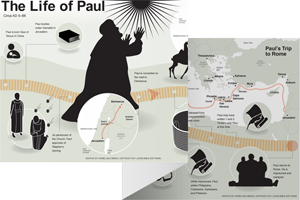11:1–18 While much of this narrative mirrors Acts 10, it focuses on God’s intervention on behalf of the Gentiles (non-Jewish people), showing that Peter has not just accepted the Gentiles as Christians but has become their advocate. |
11:2 those of the circumcision Likely refers to those in the Christian community who wanted to require Gentiles to first become Jews—including requiring the men to be circumcised—in order to be considered true Christians (compare Gal 2:3 and note).
11:12 not hesitating The phrasing here could suggest either that Peter should not delay in going with the men to see Cornelius, or that Peter should go without discriminating against them (since they were Gentiles).
11:14 you will be saved It appears Cornelius had not communicated to Peter this part of the angel’s message before Peter began speaking to those gathered at his house (Acts 10:33).
household Compare 2:39 and note.
11:15 at the beginning Peter refers to the events at Pentecost (2:2–4).
11:16 the word of the Lord See 1:5.
11:17 who was I to be able to hinder God Peter’s language and reasoning here seem to echo Gamaliel’s argument to the Sanhedrin that if God is indeed behind the Church’s message and mission, then no one will be able to stop it (5:38–39).
11:19–30 The early church’s mission continues to the Gentiles, as demonstrated in Antioch and the reintroduction of Saul to the Acts narrative. |
 Paul: A Life of Redemption and Transformation
Paul: A Life of Redemption and Transformation
11:19 as far as Phoenicia The mission of the early church extends into the region of Phoenicia—in modern-day Lebanon, north of Israel along the Mediterranean coast—beyond Caesarea (8:40) and to areas besides Damascus (9:1–2).
Cyprus A large Mediterranean island that figures prominently in Acts (e.g., 4:36; 15:39; 21:3; 27:4).
Antioch The Roman military and administrative capital of its region in southern Asia Minor (modern-day Turkey).
except Jews alone Luke (the narrator) underlines the culturally limited scope of the church’s witness beyond Jerusalem prior to this point. See 8:4.
11:20 Cyrene A city in northern Africa (modern-day Libya) settled by Greeks, which in the first century had a large Jewish population.
Hellenists Referring to Greek-speaking non-Jews, as opposed to traditional Jewish people and Greek-speaking Jews, to whom Christians had primarily been spreading the gospel message. Compare note on 6:1.
11:21 large number who believed In Acts, a large number of converts often accompanies the gospel reaching new regions (e.g., 2:41; 5:14; 6:7).
11:26 Christians The Greek term used here, christianos, which may be literally rendered “of Christ” or “belonging to Christ,” refers to “Christ followers.” The community began to be known as a distinct movement from Judaism that was loyal to Jesus as Messiah (or Christ) and Lord (compare 2:36 and note; 10:36).
11:28 Agabus This prophet appears again in 21:10.
in the time of Claudius Claudius was emperor of Rome from ad 41–54. The famine may have begun in ad 40, but reached its pinnacle in ad 44–48, as reported by the first-century Jewish historian Josephus (Josephus, Antiquities 3.320; 20.101).
 Political Leaders in the New Testament Table
Political Leaders in the New Testament Table
11:29 determined to send financial aid for support The new Gentile believers in Antioch desired to show the same grace that they had been shown, by helping to relieve the suffering of their Jewish Christian brothers and sisters.
11:30 Barnabas and Saul Two of the most vital people in the Church’s call to establish the Gentile mission and move it forward. Compare Rom 15:25–27; 2 Cor 8–9.

|
About Faithlife Study BibleFaithlife Study Bible (FSB) is your guide to the ancient world of the Old and New Testaments, with study notes and articles that draw from a wide range of academic research. FSB helps you learn how to think about interpretation methods and issues so that you can gain a deeper understanding of the text. |
| Copyright |
Copyright 2012 Logos Bible Software. |
| Support Info | fsb |
 Loading…
Loading…

